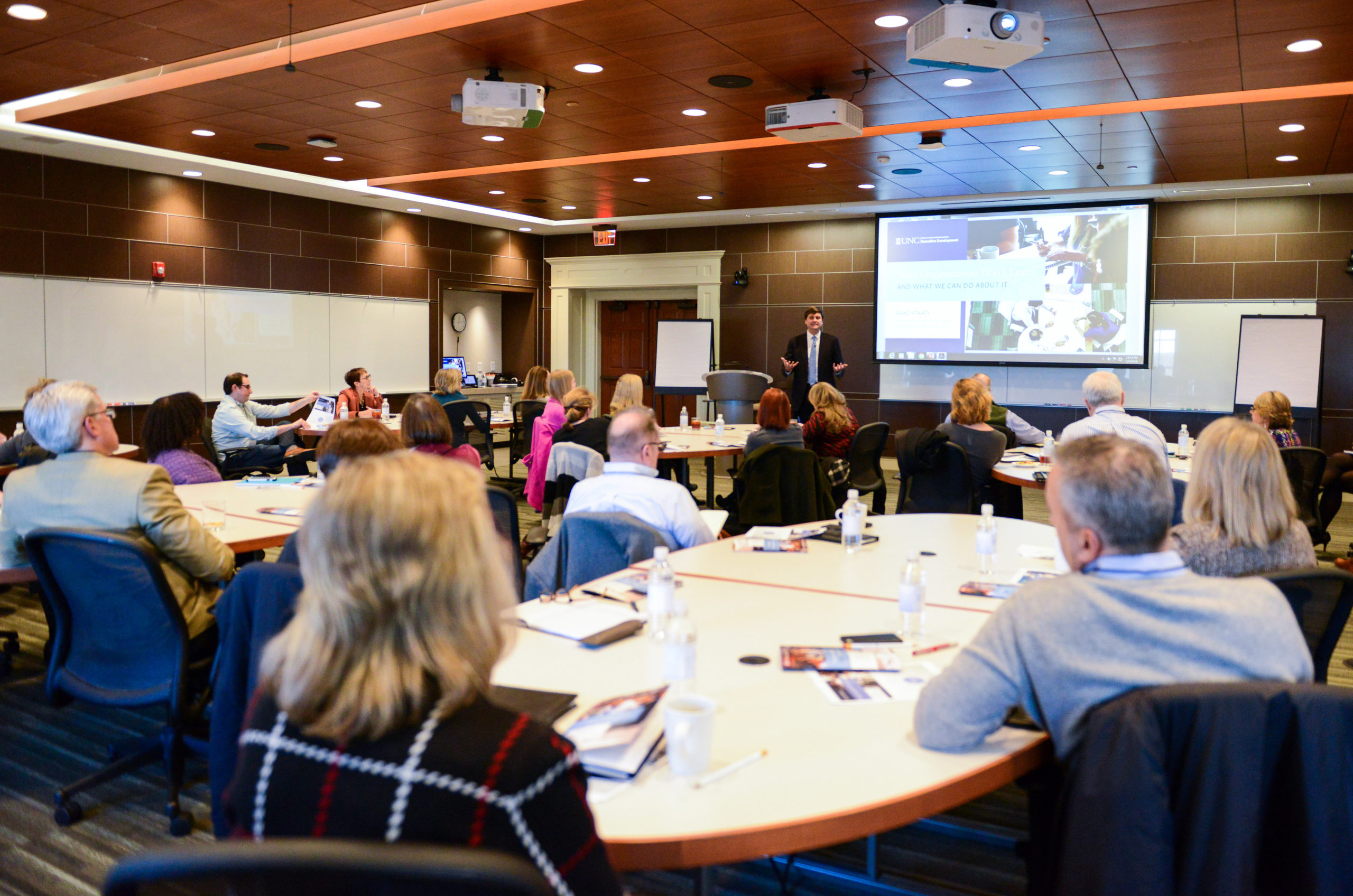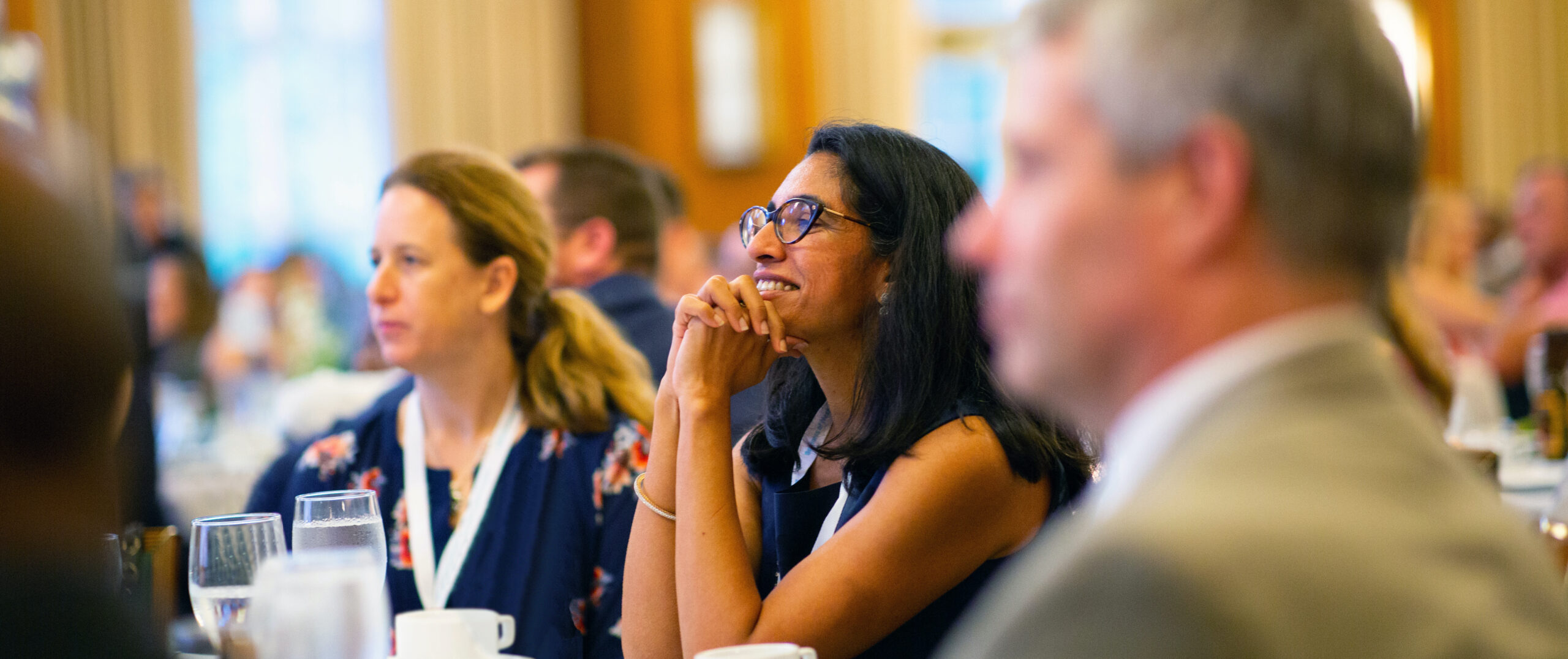Thought Leadership
The Key to Great Executive Education? Listening.

For Stephen Hyde, listening, understanding, being thoughtful, asking the right questions, and being inclusive are pivotal human skills for today’s executive education leaders to master. He also believes that these skills are necessary to build successful programs, shape behavior in individuals, teams, and organizations, and lead the field in best executive education practices that match the demands of modern leaders.
After two decades in Boston, Stephen’s arrival at UNC Executive Development as President is a return to North Carolina. Having received his undergraduate degree at Elon University, just a short distance from Chapel Hill, Stephen brings back a wealth of new insights and experiences from his time at Harvard University. During that time, he developed a deep understanding of the challenges faced by clients in the corporate world, the latest best practices in learning, and expertise around how to unlock knowledge and embed new behaviors in adults.
“I have spent my career in executive development, professional development, and lifelong learning. It has become a passionate interest. I have seen the impact we have had, for individuals and teams, and at every level of an organization. I have always been interested in learning and human development — in the ways we grow, and change, and adapt over time.” — Stephen Hyde
In this Q&A the newest member of UNC Executive Development’s leadership team shares some of those insights, discusses themes that drive him personally, and presents the ideas that will inform his work at UNC.
As someone in the business of personal development and upskilling, what is a skill you have personally been working on lately?
Listening. That may seem basic, but it is a practice I have learned you have to return to with intention. Especially coming into new spaces and meeting and working with new people. And throughout any process of change and growth, whether individually, as a team or as an organization.
What is the one challenge that you and UNC can solve, that would make the single biggest impact on an organization?
Again: listening. We help organizations identify and understand the root causes and contributing factors around their major challenges and growth opportunities. By listening carefully to what an organization aspires to and is experiencing, we can create learning experiences that enable their people to work through those challenges and find paths forward. Rather than offer ready-made solutions, we build capacity that enables people within an organization to undertake novel approaches that help them compete and reach their organizational goals and objectives — and it starts with listening, and then responding thoughtfully with the right content and learning.
UNC has an events series titled “Becoming a Modern Leader.” The topics are: Inclusive Leadership, Fostering Innovation, Communication in Crisis, Leveraging Networks, and Leading with Energy. What is your top skillset recommendation for a modern leader?
I do not think there is one single skillset for every modern leader. It is all contextual and situational — there are many critical skills required, depending on that context. A leader needs to assess what is going on in their market and in their organization and to respond in thoughtful ways and with well-informed practice that is tuned in response to a particular set of variables.
That said, I think for many organizations around the world practicing inclusive leadership is critically important. Not as a trend, or a moment in time, but as a way of ensuring all stakeholder voices are reflected in the work of the organization, and thus the organization has a far greater likelihood of being able to think and act in response to new and different challenges. And that inclusive leadership needs to take into consideration those inside the organization, those the organization pays attention to and serves in positive ways, and the overall ethos the organization carries into its work.

Technologies such as AI, automation, blockchain, and robotics are reshaping the talent needs of organizations and the employability needs of individuals. How do you see executive education responding to these new demands?
I think our capacity to use data ourselves in helping executives understand and leverage information in new ways, across wide ranges of variables, is what is so exciting about this era we have entered. We now have tools and capabilities which prior generations of leaders and managers simply did not have at their disposal. For education providers it comes down to our level of sophistication with those tools, gathering the right information about our learners, asking the right questions about context and organizational dynamics, and making sense of the data alongside our clients so that their people grow in the right areas is going to be increasingly important.
There is also increasing sophistication to how we keep track of knowledge and make it available over a period of time. The portability that blockchain and other digitally enabled technologies makes possible, can help us provide continued support to learners, even if they were with us months or years ago, in an ongoing response to their emerging needs and the needs of their organizations. These technologies should help both organizations and individuals develop and maintain better insights into their strengths and weaknesses, and enable them to pursue relevant, timely learning experiences that meet their needs on an ongoing basis.
The pandemic brought a tipping point in digitization that impacts all our lives — from remote work, to remote medical appointments, to a huge boom in e-commerce. According to PwC, 83% of employers say the shift to remote work has proved successful. How do you see these trends affecting executive education provision?
As a sector within the overall education space, we have already — long before Covid — been adapting to the changing needs of our clients, with respect to the times and places in which learning and development can occur. So rather than a tipping point I would think of it as an acceleration of a change already underway.
There is more buy-in now from those who may have been skeptical about the potential for high-quality online learning, or the notion that even the most senior leaders can and will engage thoughtfully with content, and with each other, in virtual learning environments.
The truth is, those spaces often enable voices and perspectives to enter the conversation in different ways — adding depth and breadth to the overall learning experience — that may not have occurred when we did not have the broad adoption of different modalities we see now.
Expansion of the “learning surfaces” we are able to leverage to meet our clients where they are — enabling people to learn in ways that suit them best — will only get more sophisticated and varied over time. That is tremendously exciting for those of us working to create exceptional learning experiences for a widely diverse set of leaders in a range of organizations around the world.
“The Great Resignation” was a defining phrase of the pandemic. Antony Klotz, the Texas A&M professor who coined the phrase, predicts turnover rates will stay high for years to come. How might this affect what organizations require of executive education?
I think, here again, this is a continuation of trends we have long seen. People are making more career moves than they were 10 years ago, and taking all kinds of personal, family and community needs into consideration in ways that are meaningfully different from a generation ago. There is also a growing need to adapt to new environments, to onboard people effectively, to drive the change that keeps organizations relevant and successful — not just serving customers, but also attracting and developing the most talented staff. As the pace of change accelerates, individuals and organizations will only thrive if they are able to help people continuously learn and grow. That bodes well for the ongoing value of executive and professional education, and lifelong learning programs based in universities that are continually researching what is working and why across a wide range of disciplines.

We continue to see a period of disruption within executive education, with increasing calls for learning that is flexible: on-demand, just-in-time skills provision, micro-credentials etc. From your perspective at UNC, how do you approach a period of disruption like this?
With excitement for the opportunity to leverage what the Kenan-Flagler Business School does fantastically well already — as the number 1 provider of an online MBA experience and part-time MBA programs that are stellar in quality and outcomes.
We have a faculty that knows how to make online and hybrid programs engaging and high impact, even when delivered in different timeframes and across modalities, to respond to the needs of learners. We are an institution that has long led the way in providing responsive, customized learning experiences, and we are well-positioned to continue expanding the ways we can meet our clients’ needs.
Right now, we see strong market demand for the specific kinds of learning experiences that UNC Executive Development and the Kenan-Flagler faculty are well-organized to provide. Our capacity as an organization to listen and respond thoughtfully to the needs of our constituents sets us apart in partnering with companies, in leveraging new modalities, and meeting their specific needs. That we are in continuing dialogue internally and with learners at the undergraduate, graduate, and professional levels — and that the people responsible for these learning communities talk with each other as both faculty and program planners — positions us well to be responsive with the kinds of timely, application-oriented learning experiences the world is increasingly coming to appreciate.
A historical strength of UNC is the breadth of experience of their faculty, including corporate and entrepreneurial backgrounds, serving on company boards, starting and running businesses, and working around the globe. How important is diversity of experience in the design and delivery of executive education?
We have a broad range of client organizations at UNC, so it is important that we be able to deliver content that resonates and deliver it with a deep understanding of how different organizations operate.
Many of our faculty consult with organizations around the world and several of them have come directly out of practice into faculty roles here. They have seen a lot of what they are teaching play-out in the real world. We have faculty who have played significant leadership roles in start-ups that have gone on to become significant organizations. Others have led wide-scale transformation and change projects at long-standing blue-chip companies. They come to their research and teaching here with a range of private sector, government, and nonprofit experiences, in addition to their research expertise in their chosen fields.
One of the things that is special at UNC Kenan-Flagler is the extent to which faculty know each other’s work and engage with each other. This enables a level of integration and cooperation I have not seen elsewhere in what is being delivered — with offline conversations around what is being covered by whom, tailoring the experience for the learners. And some of that is demand-driven, with clients asking for a diverse range of content to respond to the complex challenges they are dealing with.
Innovation has been a key topic in executive education for ten years or more. Do you view UNC Executive Development as an innovative provider — and what are some areas you are currently, or would like to be, innovating in?
One of the things that is really exciting about UNC Chapel Hill being a broad-based academic institution with deep expertise and significant national standing in a range of different academic areas — is this opportunity to think about interdisciplinary and multidisciplinary program experiences. We can help organizations in particular spaces, and with functional areas spanning different disciplines work through challenges and toward solutions, around problems that are inherently multimodal or multidisciplinary.
Not every institution has the capacity to play nicely across schools, across academic areas, across faculty. UNC is an institution that is not only willing to do that but is really structured in a way that makes this approach possible. And from what I have seen even in my first two months here, it happens often — through a very collegial relationship between schools.
It also matters that the faculty in these other professional schools are at the top of their fields and are already regularly engaged by private enterprise. Often our faculty are helping scientists directly, engaging in research and providing guidance to corporations around their services and products, for example. I think there is a real opportunity to tie together the business practices and the strategy piece, with a deeper understanding of the fundamental disciplines from which certain products and services derive across industries, and the market spaces where these companies are focused. I think we have a unique comparative advantage there, with such broadly-based and highly accomplished research taking place across UNC Chapel Hill.

The question of impact is an evergreen topic in executive education. Where do you stand on the subject of impact and how will you measure impact at UNC?
It is vitally important to quantify and qualify impact where possible — especially if you are working in close collaboration with an organization willing to share their own observations about what has changed and improved — which is the real quantifiable ROI of executive learning.
It cannot simply be the immediate feedback from an excited cohort that had a wonderful experience here in North Carolina — in what is a beautiful environment, where they were treated as experts in their own right and invited to share what they know. Measuring impact some time after a learning experience, that is about an individual or a team’s self-reflection and self-reporting on the way they thought about something previously, and the way they think about it now — “I used to think, and now I think.” That is meaningful, qualitative insight.
In specific instances we have come to understand where we have helped make those businesses more efficient and saved literally billions of dollars. That is really meaningful too of course, where we can say, “yes, over this 10-year period, we helped this particular global institution save $4.6 billion dollars, by thinking differently about how they manage supplier and manufacturer relationships” — for example. That is incredibly powerful too: real data and hard numbers that demonstrate impact.
Customized executive education — or learning solutions tailored for organizations — can look very different from one business school to another. Could you describe your own approach to customized executive development with UNC?
It comes down to our capacity to listen and be thoughtfully responsive to the very particular needs of an organization. Not all faculty in all institutions are oriented or disposed to do that. In some cases, it might approach that line between teaching and consulting, in a way that makes some institutions uncomfortable. That the faculty here really do listen and work to understand where a given organization is in their work enables us to think not only about the content, but to think about the pacing, to set the right period of time, to choose what kinds of technologies we use, and what modalities we employ to meet learners where they are.
This is an opportunity UNC is really well-organized to take advantage of — doubling-down on our capabilities in providing tailored and responsive learning experiences, with an informed perspective on who your people are, where they are in their own learning, what your strategy is, and how particular learning experiences can help drive that strategy.
Where do you see UNC Executive Development in five years?
I think in many respects, we are one of the best kept secrets in executive education. My role is to make sure we are visible everywhere that we are having an impact, even if we cannot disclose specific client names, so that impact does not fly under the radar. We have work to do in making it known we have as large a footprint as we really do.
We want to establish ourselves as the premier partner for thoughtfully tailored learning experiences that are sustained over time within organizations. A lot of that has happened thanks to word of mouth, and still we can support that kind of communication in different ways.
I see us deepening our investment in our capacity to really partner with organizations, not for the “one-and-done” informational programs that once passed for good professional learning, but for longitudinal, thoughtful collaborations over a period of time, that really drive change through multi-level, organizationally-embedded learning programs. I think that is a particular capability here, and I think it is also where the field is moving. We have an opportunity to lead in this space of highly responsive, partnership-based learning.

You have only just returned here to North Carolina, but away from work what are you enjoying and looking forward to?
My family loves being outside, and I have a two-and-a-half-year-old daughter who is obsessed with trees! We have been able to take her out on hikes every weekend and she is really excited about what she is finding.
We are really excited about Chapel Hill and the community we are finding here – it is just as warm and welcoming as we had hoped! And the beach being just a couple of hours away, and the mountains, is wonderful. For my wife, there are two things that are of primary interest: one, she is a landscape designer and there is almost no better place in the country to be, in terms of the kinds of landscapes she can design here and what she has to work with. The other thing for her is, she is Puerto Rican and, at least relative to Boston, we are kind of halfway home for her. This is an environment that is a lot closer to how she grew up, both in the way we have been received culturally, in the warmth of southern hospitality, and quite literally — we are just closer to home!